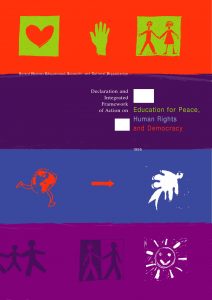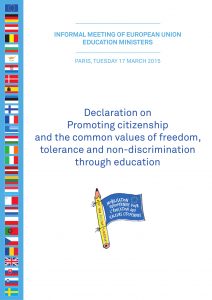WHY THE EDUCATION INSPIRING PEACE (EIP) LAB?
In recent years much attention has been paid to making education closer to labour market needs, renewing qualifications, establishing standards of competence and assessment. While this is important, there is the need to remind those in government, those who do research and those who educate children and young people each day in schools and universities that education also has important objectives beyond the professional dimension of human development. To be successful, education must focus on the whole development of the individual. This includes factors such as self-knowledge; an understanding of culture; the discovery of one’s creativity and potential; training in the arts and music; the knowledge of other cultures; the preparation for active citizenship; understanding and appreciating diversity in the society; the development of thought; skills in analytical and independent evaluation; orientation to peace, and democracy, the confrontation of opinions and respect for rights and coexistence.
All these dimensions are part of a humanistic vision of education, oriented to peace and respectful social coexistence. This view of education has its origins in the work of Socrates and Erasmus, and led to the creation of UNESCO. Italian scholars and policy makers have made a very marked contribution to this field including the work of Maria Montessori and Loris Malaguzzi’s Reggio Emilia Children Project. These holistic educational dimensions are of critical importance today and into the future especially in times when the relationship between cultures, religions, and communities play such a crucial role in ensuring a peaceful society. The recent Declaration of the Ministers of the European Union on “Promotion of citizenship and the common values of freedom, tolerance and non-discrimination through education” (17 March 2015) following on from twenty years since the UNESCO Declaration on “Education for peace, human rights and democracy” (November 1995) provide a clear demonstration of how the issue of humanistic education is perceived as highly relevant internationally.
Therefore, in connection with other research initiatives and training active in other parts of the world, it was proposed to create an “Education Inspiring Peace Laboratory” that would become an international reference for policy makers, educators and researchers on these crucial dimensions of education, using the potential of digital media and the processes of internationalisation of education policies currently underway.
Comments are closed.



1 Comment so far
Europe Day – celebrating 72 years of peace and unity in Europe – EIP LaboratoryPosted on8:45 am - May 10, 2022
[…] Concept […]